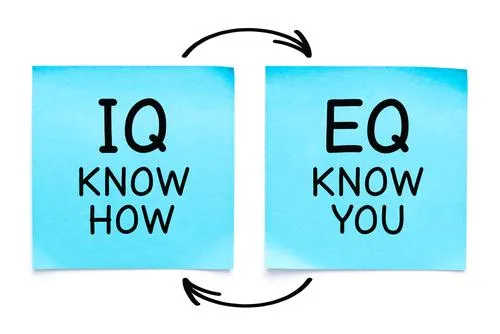The Renowned Blog

The Importance of Emotional Intelligence in Leadership: Key Traits and Development Strategies
“Empathy is the ability to understand and share the emotions of others, which allows leaders to connect with their team members on a deeper level and build trust.” - Stephen J. Morris
Introduction:
Effective leadership is not just about technical skills and expertise but also about emotional intelligence. Emotional intelligence, or EQ, is crucial in how leaders connect with their teams, make decisions, and drive results. In today's fast-paced and competitive professional settings, the significance of emotional intelligence in leadership cannot be overstated. In this blog post, we will explore the key traits of emotional intelligence, its benefits in leadership, and practical strategies for developing EQ as a leader. Discover how enhancing your emotional intelligence can positively impact your leadership effectiveness and drive success in various professional settings.

“Developing emotional intelligence is crucial for effective leadership...” - Stephen J. Morris
Emotional intelligence, often abbreviated as EQ, refers to the ability to recognize, understand, and manage one's own emotions, as well as the emotions of others. It encompasses a range of skills, including self-awareness, empathy, social skills, emotional regulation, and motivation. Research shows that emotional intelligence is a critical factor in effective leadership, with studies indicating that EQ can account for up to 58% of success in various leadership roles (Bradberry & Greaves, 2005). Leaders with high EQ are better equipped to understand and manage their own emotions, navigate interpersonal dynamics, build meaningful relationships, inspire and motivate others, and make informed decisions. In today's complex and diverse professional settings, emotional intelligence has become increasingly relevant as leaders strive to create positive work environments, foster collaboration, and drive organizational success.
Emotional intelligence is characterized by several key traits that are essential for effective leadership. Self-awareness is the foundation of emotional intelligence and involves recognizing and understanding one's own emotions, strengths, weaknesses, and values. For example, a self-aware leader may acknowledge when they are feeling frustrated during a high-pressure meeting and take steps to manage their emotions, such as taking deep breaths or stepping outside for a moment to regain composure.
Empathy is the ability to understand and share the emotions of others, which allows leaders to connect with their team members on a deeper level and build trust. For instance, a leader who demonstrates empathy may take the time to listen and understand the concerns of a team member going through a difficult personal situation and offer support and flexibility. Social skills encompass a range of abilities, such as communication, conflict resolution, and networking, that enable leaders to navigate complex social dynamics and build positive relationships.
Self-regulation involves managing one's emotions and impulses, which allows leaders to respond to challenging situations with composure and professionalism. For example, a leader who practices self-regulation may pause before responding to a provocative email or criticism, and respond in a measured and constructive manner.
Lastly, motivation involves the drive and determination to achieve goals, persevere through challenges, and inspire others. A leader who is motivated may set challenging goals for themselves and their team and demonstrate resilience in the face of setbacks. These critical emotional intelligence traits are crucial for leaders to effectively manage themselves, understand others, and navigate complex interpersonal dynamics in various professional settings.
The benefits of emotional intelligence in leadership are numerous and far-reaching. One of the key advantages is improved communication. Leaders who possess emotional intelligence are skilled at understanding and managing their own emotions, as well as interpreting and responding to the emotions of others. This allows them to communicate effectively, both verbally and non-verbally, and build strong relationships based on trust and mutual understanding.
Additionally, emotional intelligence enhances decision-making. Emotionally intelligent leaders can consider not only the rational aspects of a decision but also the emotional implications and impact on stakeholders. This leads to more well-informed and balanced decision-making that considers the human element of leadership. Moreover, emotional intelligence promotes enhanced team collaboration. Leaders with emotional intelligence can effectively manage conflicts, resolve disputes, and foster a positive team environment where individuals feel heard, respected, and valued. This leads to better team dynamics and improved team performance.
Furthermore, emotional intelligence contributes to increased employee engagement and retention. Emotionally intelligent leaders can connect with their team members on an emotional level, leading to higher engagement, motivation, and loyalty. Employees who feel understood, supported, and appreciated are likelier to stay committed to their organization and contribute their best efforts. Overall, emotional intelligence in leadership brings a wide range of benefits that positively impact the overall effectiveness of leaders and their ability to lead teams to success.
Developing emotional intelligence is crucial for effective leadership and can be achieved through practical strategies and techniques. Self-reflection is a valuable strategy for enhancing emotional intelligence, as it allows leaders to introspect and become more aware of their thoughts, feelings, and behaviors. Self-assessment tools can also help identify areas for improvement and increase self-awareness.
Mindfulness practices, such as meditation and mindfulness exercises, can improve emotional intelligence by promoting self-awareness, self-regulation, and empathy. Active listening, where leaders genuinely listen to others without interruption or judgment, fosters better communication and understanding, critical components of emotional intelligence.
Conflict resolution skills, such as managing disagreements and addressing issues constructively, can also contribute to developing emotional intelligence in leaders. Lastly, continuous learning through reading, attending workshops or seminars, and seeking feedback can help leaders continually improve their emotional intelligence skills. Incorporating these practical strategies and techniques into their leadership practices can help leaders enhance their emotional intelligence and become more effective in their roles.
Developing emotional intelligence as a leader can come with its share of challenges. These may include difficulties in recognizing and managing one's own emotions, navigating conflicts with emotional intelligence, or maintaining a balance between empathy and assertiveness. Additionally, external factors such as organizational culture, time constraints, and resistance to change can also pose challenges in developing emotional intelligence skills.
However, there are strategies that can help overcome these obstacles. These may include self-reflection, seeking feedback from others, practicing mindfulness, and investing in continuous learning and development opportunities. By being aware of these challenges and actively working towards overcoming them, leaders can cultivate and strengthen their emotional intelligence skills, which can greatly enhance their effectiveness as leaders.
Emotional intelligence is a critical factor in effective leadership, as it empowers leaders to understand, manage, and harness emotions in themselves and others. Through self-awareness, empathy, social skills, self-regulation, and motivation, leaders can create a positive work environment, foster meaningful connections with their teams, and make sound decisions. Furthermore, by investing in development strategies such as self-reflection, self-assessment tools, mindfulness, active listening, conflict resolution, and continuous learning, leaders can enhance their emotional intelligence skills. The benefits of emotional intelligence in leadership are numerous, including improved communication, better decision-making, enhanced team collaboration, and increased employee engagement and retention. Leaders need to recognize the significance of emotional intelligence in their leadership style and actively work towards developing and enhancing these skills for improved leadership effectiveness.

Stephen J. Morris
December 18, 2023
Founder & CEO
Renowned Leadership
©️ 2023
Never miss a new post!
Subscribe to our blog for free so you never miss the latest from Renowned Leadership.
We respect your privacy. Your information is safe with us and will never be shared. By submitting your email, you agree to receive occasional updates and valuable resources from us. You can unsubscribe at any time.

© 2024 Renowned Leadership LLC

